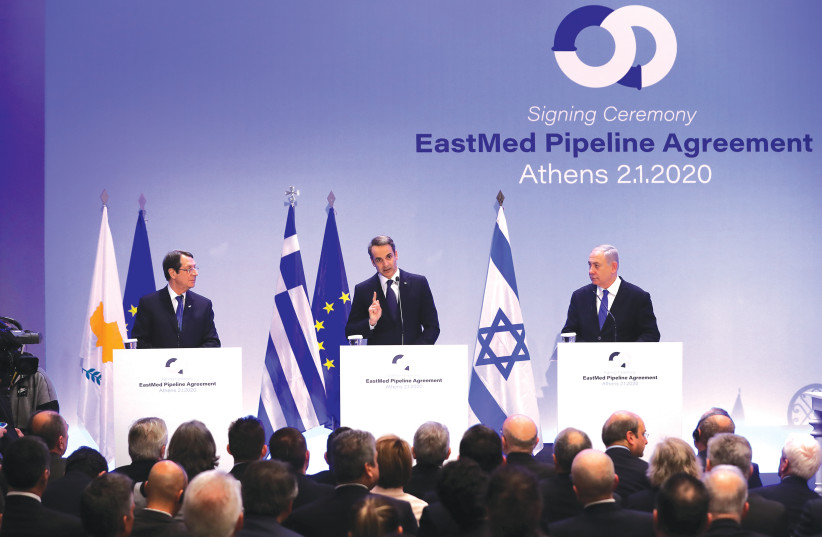US opposition to a pipeline from Israel to Greece via Cyprus will cause ripples across the Mediterranean.
Although the concept has been around for years, it gained momentum in January 2020 during a trilateral summit between the three countries of the “Energy Triangle.” It was opposed by Turkey, which sought a deal with Libya that would cut across the pipeline in vast Turkish claims over the seas.
The new US administration has voiced misgivings and no longer supports the pipeline, according to reports that first emerged in Greece and have now been confirmed. Turkish right-wing media – which is pro-government – have celebrated the US comments. While Turkey’s ruling party hosts Hamas and is anti-Israel and anti-American, it also wants to sabotage Israeli-Greek ties and isolate Israel politically in the region.
The US State Department has told Israel’s Foreign Ministry that it no longer supports the pipeline.
“[The] American side expressed to the Greek side reservations as to the rationale of the EastMed pipeline, [and] raised issues of its economic viability and environmental [issues],” a Greek government source told Reuters, reported yesterday by The Jerusalem Post.

“The Greek side highlighted that this project has been declared a ‘special project’ by the European Union, and any decision on its viability will logically have an economic impact,” the official said. The reports say that State Department Senior Advisor for Energy Security Amos Hochstein also opposes the concept.
However, the US continues to support close Israel-Greece-Cyprus ties. Hochstein has been reportedly involved in Israel-Lebanon maritime issues and also was said to be involved in US support for an energy deal that could see Israeli gas go to Lebanon via Jordan. America denied that story, however.
US opposition to the pipeline is ostensibly due to environmental issues. The fact is that Israel has never plowed investment into this pipeline concept either. Despite all the talk, it hasn’t begun building anything. This is in contrast to Turkey, Russia and other countries that tend to build pipelines when they say they will. Russia has built NordStream and, with Turkey, built TurkStream.
This is because Russian, Turkish and other authoritarian regimes put their policies first and don’t care about environmental issues. They also don’t need US support. Lastly, they like big projects that earn profits, rather than talking and waiting. That is why Europe doesn’t build pipelines, but other countries tend to.
THIS ISN’T the first pipeline project that has been all talk and ended up in frustration. Another project to run a pipeline from Eilat to bring Gulf oil to Europe was stopped in November by the Environmental Protection Ministry. It was supposed to be a 10-year deal that would have brought the UAE and Israel together on this project from Eilat to Ashkelon.
The apparent decision to stop both pipelines has important implications. While the EastMed pipeline deal isn’t necessarily off the table, the lack of US support matters because it doesn’t put wind in the sails of those behind it. In addition, the fact that since 2020 nothing has really been done to start building the project means that the countries involved likely didn’t take it seriously.
Israel’s change in government might be linked to this issue. In December 2021, the Jewish state decided to halt its search for natural gas off the coast and focus on renewable energy.
This basically means that countries like Turkey, China, Russia, Iran and others will be searching for natural gas and building pipelines while Israel will be focusing on environmentalism. This is a good fit for Israel and the West, but it’s unclear if Jerusalem will ever engage in or profit from major renewable energy projects that bring it strategic alliances.
The thing about pipelines is that they tend to bind countries together on common goals. Pipelines lead to alliances, and countries that run them get power from them. That is how Russia uses natural gas supplies to Europe to leverage its interests in places like Germany. Economic power matters and countries that have it can open doors in places like Europe.
Israel doesn’t lack for wealth and success, it has its “Start-Up Nation” credentials and successes in hi-tech and artificial intelligence, but the world requires some economic diversification. The pipelines from Eilat and also to Greece might have revolutionized southern Israel and helped cement a pact between Israel, the Gulf and Greece as well as strengthening ties to Jordan, Egypt and France.
The changing US views didn’t stop all that from happening, but they are a piece of the puzzle and Jerusalem appears to be shifting along with Washington away from these projects. Whether this means that countries like Turkey, which have supported terrorist attacks against Israel and vowed to “liberate” Jerusalem for the Palestinians, will now have more leverage over Jerusalem, remains to be seen.
